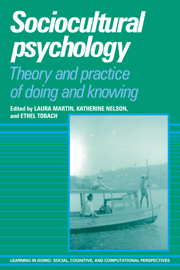Book contents
- Frontmatter
- Contents
- Series foreword
- Preface
- Contributors
- 1 Introduction
- Part I History and culture
- Part II Doing psychology
- 5 Opening vistas for cognitive psychology
- 6 Analysis of developmental processes in sociocultural activity
- 7 Linking thought and setting in the study of workplace learning
- 8 Cultural–historical psychology: A meso-genetic approach
- 9 The abstract and the concrete
- 10 From spontaneous to scientific concepts: Continuities and discontinuities from childhood to adulthood
- 11 The psychology of Japanese literacy: Expanding “the practice account”
- 12 Voices of thinking and speaking
- Part IV Activity in work and school
- Index
7 - Linking thought and setting in the study of workplace learning
Published online by Cambridge University Press: 05 November 2011
- Frontmatter
- Contents
- Series foreword
- Preface
- Contributors
- 1 Introduction
- Part I History and culture
- Part II Doing psychology
- 5 Opening vistas for cognitive psychology
- 6 Analysis of developmental processes in sociocultural activity
- 7 Linking thought and setting in the study of workplace learning
- 8 Cultural–historical psychology: A meso-genetic approach
- 9 The abstract and the concrete
- 10 From spontaneous to scientific concepts: Continuities and discontinuities from childhood to adulthood
- 11 The psychology of Japanese literacy: Expanding “the practice account”
- 12 Voices of thinking and speaking
- Part IV Activity in work and school
- Index
Summary
Introduction
One of the last projects that Sylvia Scribner supervised at the Laboratory for Cognitive Studies of Work was a project called Technical and Symbolic Knowledge in CNC Machining. Computer Numerical Control (CNC) is an electronic technology that affects the traditional organization and definition of jobs in the industrial workplace. Specifically, it introduces machines in which manual setup operations are replaced by setup dependent on electronic commands executed through a computer program. Over the three years of its existence, the CNC project looked at how machinists learn to use computer–based machine tools and sought to address several key questions about adult learning.
First, the research looked at changes in activity when electronic technology is introduced and at the nature of the relation between someone's existing technical knowledge and newly acquired symbol system based on programming code. It asked whether the new system is additive to the old, whether the new displaces the old, or whether it transforms the old system in some way. The study also asked about the forms adult learning might take and whether the formal or informal origins of the knowledge affect the application of particular concepts. What were the differences, we asked, between knowledge that is acquired through practical, hands-on activity and that which is based on abstract representation (such as computer code) learned in the classroom? In addition to questions about technical knowledge, we asked about the relation between machinists' educational backgrounds and their problem solving strategies, as well as about their images of themselves as workers.
- Type
- Chapter
- Information
- Sociocultural PsychologyTheory and Practice of Doing and Knowing, pp. 150 - 167Publisher: Cambridge University PressPrint publication year: 1995
- 6
- Cited by



